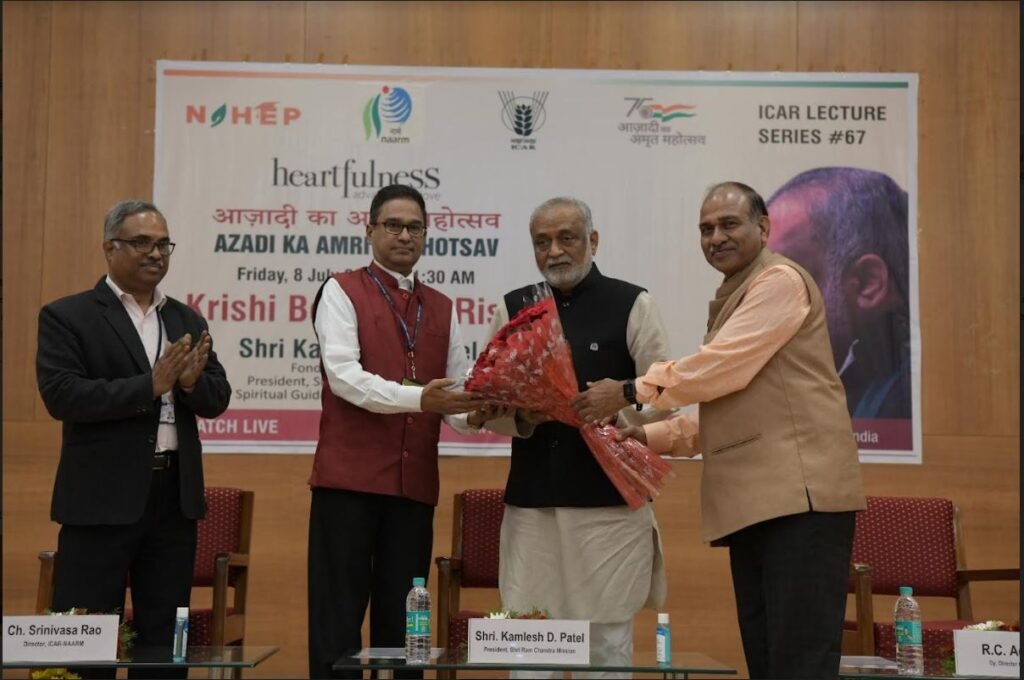Hyderabad, 9 July 2022: The Guide of Heartfulness Shri Kamlesh Patel ‘Daaji’ delivered a lecture at the Indian Council for Agricultural Research (ICAR) – National Academy of Agricultural Research Management. Daaji’s lecture is the 67th of the massive outreach campaign titled ’75 lecture series’ by ICAR which was organized as part of the 75th year of India’s independence ‘Azadi ka Amrit Mahotsav’ activities. ICAR is the apex body for coordinating, guiding, and managing research and education in agriculture including horticulture, fisheries, and animal sciences in the entire country. The 75 lectures are being delivered by experts in various domains related to agriculture, and education and also by eminent scientists, policymakers, spiritual leaders, motivational speakers, and successful entrepreneurs.
Speaking on the occasion Shri Kamlesh Patel ‘Daaji’ said, “India has predominantly been an agricultural country. With the Green Revolution in India, we have become more self-reliant in our produce. Interestingly when compared to other products, India is the largest exporter of agricultural products. ICAR had earlier forecasted that the demand for food grains will increase to 345 million tonnes by 2030. With the population explosion, there is also an increasing need for better and more yield. What it also means is that we need more hands, better technologies, better agricultural practices, and more organic cultivation. When we say ‘more hands’ we mean more farmers and agriculturists. Farmers who feed society and they need to be given more respect and dues. The right knowledge transfer, technology enablers, and sustainable agricultural practices must go one step beyond the green revolution now.”
He added, “More and more people are moving to urban centers for the sheen of white-collar jobs. We also need to create avenues wherein besides drawing the right education, these youth can take to agriculture with the same dignity. Food is the basic need of life, everything else follows it. Only when well-nourished can one think of the integrity of mind, body, and spirit. It’s time we can educate our society on revolutionizing agriculture as a holistic career – from getting over external gloss and finding the light within. Right from the Vedic times, our rishis have put great emphasis on agriculture. The great sage Parashara handed down his teachings on agriculture through Krishi Parashara. His son Vashista rishi advocated sustainable agriculture and organic farming. They were the examples of men who taught us the means of livelihood and yet remained connected with the divinity within. We too need to move from being a Krishi to a Rishi. India must be the harbinger of a sustainable revolution in agriculture with a soul and we hope we can take the message across.”
The 75 lecture series is being coordinated by Dr. RC Agrawal, Deputy Director General (Agril. Education), ICAR. Dr. Agrawal informed about the contribution of ICAR along with Agricultural Universities has made the country self-reliant in food production. The ICAR is now striving to make the country free from malnutrition by developing fortified crop varieties, climate-smart agriculture, developing improved animal breeds, and many dimensions related to nutrition. The lecture was attended by Vice-Chancellors of Agricultural Universities, Deputy Director Generals of ICAR, Senior staff of ICAR, Senior Professors and faculty of Agricultural Universities, Teachers, scientists, and students.
Dr. Ch. Srinivasa Rao, Director, NAARM said, “ICAR-NAARM has pioneered focused research in the areas of agricultural research, agricultural policy, research project management, education management, technology transfer, human resources development, and information technology. Over the years we have accomplished prestigious projects through the cumulative efforts of our dedicated scientists and helped make a difference in the agricultural landscape in India through novel and long-term solutions. It is not merely the research but having a sound policy framework that helps the implementation of various agricultural programs which in turn drive the focused projects. From taking India to being an agriculturally independent country, our next milestone must be to build agriculture as a key growth avenue that leads to employment, attracts talents, and generates more research and innovation.”
In past, 66 lectures have been delivered by eminent personalities like Dr. Jacqueline d’Arros Hughes, DG, ICRISAT; Gurudev Sri Sri Ravi Shankar (spiritual leader), Dr. Rajeev Varshney (ICRISAT), Prof. Ramesh Chand, Member, NITI Ayog; Prof. Virendra Kumar Tewari (IIT-Kharagpur), Dr. Steve Goss (World Bank Consultant), Sh. Pratap Chandra Sarangi (Hon’ble Former Minister of State), Dr. JC Suri (Member of the National Expert Committee on Covid-19), Mr. Priyank Kanoongo (Child Rights), Mrs. Rekha Sharma, Chairperson, National Commission for Women. The past lectures can be accessed on:
https://icar75lectureseries.webconevents.com
https://icar.org.in/node/15477
With 111 ICAR institutes and 74 agricultural universities, 730 Krishi Vigyan Kendras (at least one in each district) are spread across the country. ICAR) is one of the largest national agricultural systems in the world. The ICAR has played a pioneering role in ushering Green Revolution and subsequent developments in agriculture in India through its research and technology development that has enabled the country to increase the production of food grains by 6 times, horticultural crops by 11 times, fish by 18 times, milk by 11 times and eggs by 53 times since 1950-51, thus making a visible impact on the national food and nutritional security. It has played a major role in promoting excellence in higher education in agriculture. It is engaged in cutting-edge areas of science and technology development and its scientists are internationally acknowledged in their fields.
